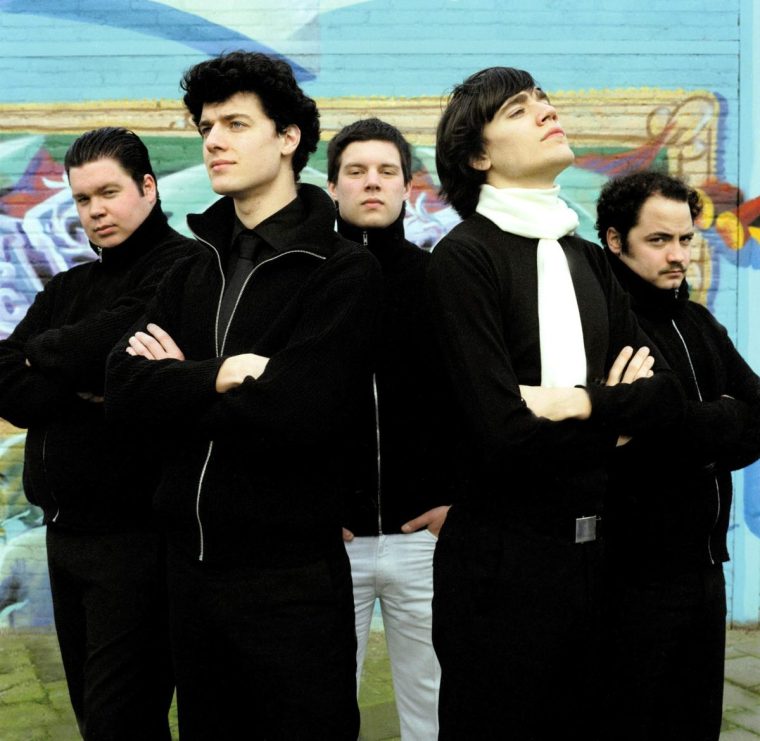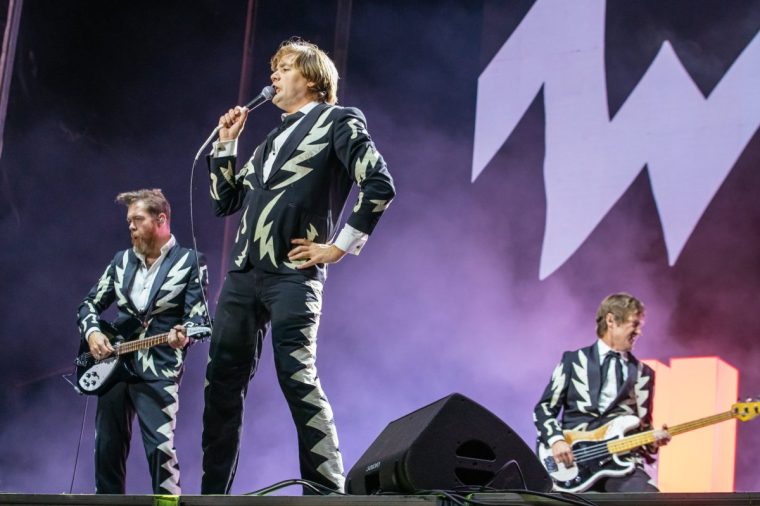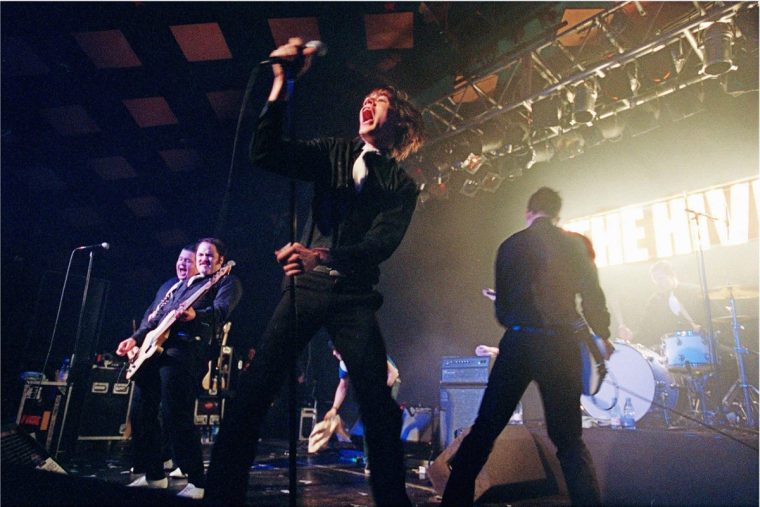Sometimes it’s hard to know what is more entertaining about The Hives: their music or their joking-not-joking vainglorious shtick about their own greatness. Since their signature anthem “Hate to Say I Told You So” crashed the charts in 2001, the Swedish five-piece have reliably added a knowing cockiness to their thrilling garage punk rock: their breakthrough compilation album in the UK was titled Your New Favourite Band.
But the press release for excellent new album The Hives Forever Forever The Hives is a work of art in the genre. Written on Royal Letterhead paper – the album cover pictures the band adorned in crowns and ostentatious black and white gowns – it turns the bravado up to 11.
I put some of the claims in there to frontman Howlin’ Pelle Almqvist as he walks around a Stockholm park one bright Monday afternoon. For starters, “most consistent good night out in European rock’n’roll since 2001”? “That’s true,” he says, and anyone who has seen The Hives’ theatrical, choreographed tour de force, complete with Almqvist’s high-kicking, crowd-surfing, playfully provocative stage presence, wouldn’t really argue. “You can’t have Oasis! They don’t play enough to be consistent.”
On to the next claim: “Can raise other bands’ heart rate, perspiration and temperature”. “I’ve seen people get nervous when we walk into the backstage area [at a festival],” he says seriously. “And that’s what you want. If you’re playing a festival, you’re trying to destroy all the other bands.” When I saw The Hives at Glastonbury in 2013, they played at midday on Friday afternoon: Almqvist announced he felt sorry for us because our weekend had just peaked. “That sounds like something I would say,” he says with a laugh.

What about: “Wears black and white outfits and is the reason your other favourite bands dress better nowadays?” Almqvist clarifies: “Before we got popular it was really uncool to have a dress code in rock’n’roll,” he says. “And then after that, Coldplay and Green Day, all those huge bands were all of a sudden colour matched. There’s a part in the Robbie Williams documentary where he’s like, ‘I want to look cool. How do I do that? Oh, I saw The Hives on TV, so I’m gonna wear that.’ We’ve been undercover celebrity stylists.”
“More punk than most punk these days, yet extremely likeable?” “A lot of punk is pretty sanitised these days. I guess Californian punk did that. You have rappers saying they’re making a punk album. It takes more than that to impress me.” And extremely likeable? “My view is maybe I think our music is more extreme than it actually is, because I meet people in the supermarket all the time and they’re like, ‘You guys are the best!’ And I’m like, ‘Oh, you like it?’” he says, sounding disappointed. “I didn’t know it would be that likable. Apparently, it is.”
And, finally: “The greatest rock band to ever grace the earth with its mere existence”. Although in 2001, they did collectively have one moment of doubt. After forming in 1993 in the small Swedish town of Fagersta (population less than 12,000), they went through years of toil. “Some gigs only seven people would turn up.” But, with the impeccable timing of an Almqvist stage move, they came to the fore just as The Strokes and The White Stripes’ so-called “New Rock Revolution” exploded (or, as the press release puts it: “garage rock revival, yeah yeah blah blah blah”).
They were always incredibly suspicious of success, having come from the punk world. “We were so cynical, we were like, ‘Oh, Morrissey is a fan now, he’s jumping on the bandwagon.’ Maybe he just actually liked the music.” So naturally, they assumed if they were popular, that meant they couldn’t be any good. “Yeah, we always grew up thinking they were mutually exclusive. And then we got popular, and we had a big identity crisis. Like, does this mean we suck now?”

But it’s not just The Hives who think The Hives are great. The Clash’s Joe Strummer once told Almqvist they had saved rock’n’roll; and they have been handpicked to support stadium tours for AC/DC, Arctic Monkeys and The Rolling Stones. (Mike Jagger imparted this bit of wisdom to Almqvist: “’Don’t buy a boat, borrow a friend’s.’ I’ve managed to use that for pretty much everything in my life.”)
After 30 years, The Hives are more popular than ever. Their revitalizing 2023 album The Death of Randy Fitzsimmons, their first after a 11-year hiatus, was their highest-charting album, reaching No 2. Their first-ever UK arena tour takes place in November. “It’s just a long, slow grind – I think that’s the trick,” he says. “It’s weird. The rock’n’roll business is not really a business where you consider that consistency and reliability is important. But it seems like it is.”
Two albums in three years: The Hives don’t usually work this quick. “It was a conscious decision to have momentum for once in our lives.” Normally, he says, The Hives would “release an album, tour for three years until we hated each other, and then spend a year becoming friends again and then starting over.” The 11-year gap from 2012’s Lex Hives was “for a million of reasons. Not agreeing on what type of album to make was one thing”.
Not really getting along was another: particularly with Almqvist’s guitarist brother, Niklas Almqvist (AKA Nicolaus Arson). “I don’t think it’s a sensible thing being in a band with your brother, as proven by history time and time again,” he smiles. “I can’t get along with him, but he’s my favourite musician. When we were arguing the most, we had all the songs and I was like, ‘I’m just gonna make my own record.’ But it just doesn’t sound right to me.” So you nearly went solo? “I think we all did when we were at our lowest points in the middle of those 10 years.”

The Hives Forever Forever The Hives was produced by long-time cohort Pelle Gunnerfeldt, with friend Josh Homme, of Queens of the Stone Age, in an advisory role (“He’s such a great cheerleader) and The Beastie Boys’ Mike D co-producing and “adding magic” in Stockholm and his home in Malibu. It was mostly recorded at Riksmixningsverket, the Stockholm studio owned by Benny Anderson of ABBA. Was he there to offer advice? “He’d pop his head in from time to time and ask us if we had any hits,” he smiles. “Not in the way you think of a hit! It’s not our business to write ABBA hits.”
The Hives just do their thing. Thinking about The Hives’ sound brings to mind something John Peel once said about Mark E Smith and The Fall: “Always different, always the same”. Their base garage rock can get punkier, darker, groovier, heavier, faster, bigger; but it all sounds like The Hives. The new album is no different. Almqvist calls the album “arena-sized Hives”, influenced by playing the vast venues on those support tours. This means their stock-in-trade blistering riffs (“Enough is Enough”, “Hooray Hooray Hooray”) and hardcore punk (“O.C.D.O.D”) can be catchy, hooky – the title track is a very The Strokes-y anthem – and with big choruses (the stomping “Paint a Picture”), but you wouldn’t mistake it for anyone else.
Alongside the rock silliness, there is also something approaching social commentary. “Legalise Living” takes a a libertarian pop at interfering governments; the lyrics to “Enough is Enough” – “Everyone’s a little f**kin’ b***h/And I am getting sick and tired of it/Went to the doctor ’cause I was sick/Sick of everybody’s bullshit” – seem like a comment on the culture wars. “Something like that, or just the feeling of being alive in 2025,” he says. “People are dividing into smaller and smaller groups arguing about smaller and smaller things.”
He goes on to talk about something you don’t expect from the Hives: the theory of atomisation. “It’s built into a capitalistic society that it’s better to have us as separate as possible as consumers. I don’t want to get too political or heavy about it. But it’s more about that feeling of exasperation.” Other songs like “Paint a Picture” and “Born a Rebel” take pride in rule breaking. “I was a born contrarian,” he says. “Which was exhausting until we formed the band and I found a place to put all that stuff. Maybe there’s some vague evolutionary advantage to that, but it came at a pretty heavy price.”
But the closing title track is a celebration of themselves, and the fact that, after three decades, they’ve realised The Hives are here to stay. “It does feel now that it’s for ever,” he says. “And also, paradoxically, it also feels like if we quit now, it will last for ever anyway. We’ve made enough of a dent that the influence will stick around. If I wished for one accomplishment in life, it was to add a band to that pile of bands that are forever in my world. So I guess I’m proud, which feels weird to say. But that’s the feeling.”
The Hives Forever Forever The Hives is out now. The Hives tour the UK until 3 September, and 24 to 29 November
